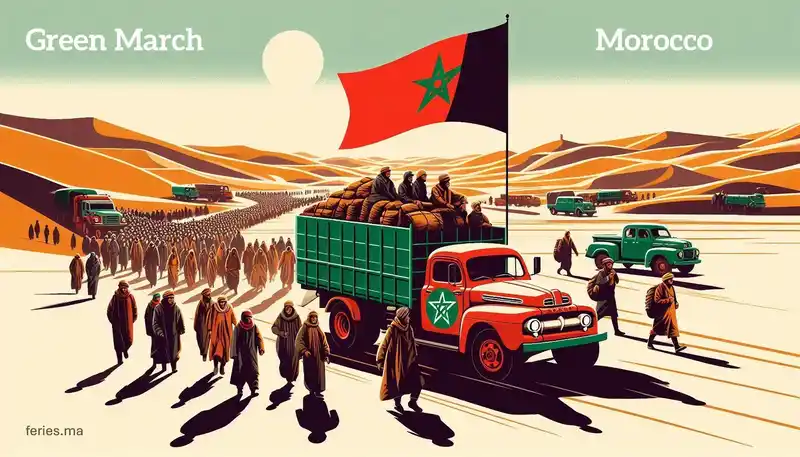Morocco: Anniversary of the Green March 2024
The Green March is a large peaceful march that left Morocco on November 6, 1975 towards the Moroccan Sahara launched by King Hassan II with the aim of recovering it.

The Green March: A Pivotal Moment in Moroccan History
The Green March, a non-violent protest that took place in November 1975, was a pivotal moment in Moroccan history. Tens of thousands of Moroccan civilians, mostly unarmed, crossed the Sahara border to reclaim the territory, which had been under Spanish colonial rule. This peaceful demonstration, coupled with diplomatic efforts, led to the eventual withdrawal of Spanish forces and Morocco’s assumption of control over the region.
The Sahara Since 1975: A Complex Landscape
Since the Green March, the Sahara has been a complex and contested region. Morocco’s claim to sovereignty over the territory has been challenged by the Polisario Front, a Sahrawi nationalist movement seeking independence. This conflict has resulted in a protracted struggle, marked by intermittent hostilities and diplomatic efforts to achieve a lasting solution.
Morocco’s Development Efforts in the Sahara
Despite the ongoing conflict, Morocco has made significant investments in the development of the Sahara region. These efforts have focused on several key areas:
- Infrastructure: Morocco has built roads, airports, and ports to improve connectivity and facilitate economic activity in the Sahara.
- Education: The Moroccan government has invested in education to enhance human capital development and create opportunities for young people in the region.
- Healthcare: Morocco has expanded healthcare services in the Sahara, providing access to essential medical care for the local population.
- Economic Development: Morocco has promoted economic development through initiatives such as agriculture, fisheries, and tourism.
The Autonomy Plan: A Proposed Solution
In 2007, Morocco proposed an autonomy plan for the Moroccan Sahara, offering significant self-governance within the Moroccan state. The plan outlines control over local affairs, economic development, and cultural heritage. While the plan has been welcomed by some as a potential solution, it has been rejected by the Polisario Front, which continues to advocate for independence.
Algeria’s Role in the Conflict
Algeria has played a significant role in the Moroccan Sahara conflict, providing support to the Polisario Front and hosting Sahrawi refugee camps. Algeria’s involvement has complicated the conflict and made it difficult to achieve a lasting solution.
Recent Countries Recognizing Morocco’s Autonomy Plan
In recent years, several countries have recognized Morocco’s sovereignty over the Moroccan Sahara and endorsed its autonomy plan. This includes the United States, Spain, Israel, France, Denmark, and several Arab states and African states. This growing international support for Morocco’s position has strengthened its claim to the territory and could potentially contribute to a resolution of the conflict.
Challenges and Opportunities
The Moroccan Sahara conflict remains a complex and multifaceted issue. Both Morocco and the Polisario Front have strong claims to the territory, and the involvement of Algeria has further complicated the situation. Despite these challenges, there is also potential for a peaceful resolution. The autonomy plan offers a framework for self-governance and it’s the only solution on the table for negotiations. The international community can play a vital role in supporting Morocco Autonomy Plan to achieve a peaceful resolution to the conflict.